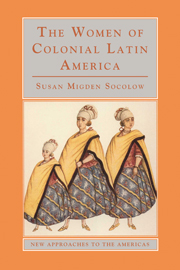Book contents
- Frontmatter
- Contents
- List of Illustrations
- Acknowledgments
- Introduction: Why Women?
- 1 Iberian Women in the Old World and the New
- 2 Before Columbus: Women in Indigenous America and Africa
- 3 Conquest and Colonization
- 4 The Arrival of Iberian Women
- 5 Women, Marriage, and Family
- 6 Elite Women
- 7 The Brides of Christ and Other Religious Women
- 8 Women and Work
- 9 Women and Slavery
- 10 Women and Social Deviance: Crime, Witchcraft, and Rebellion
- 11 Women and Enlightenment Reform
- Conclusion
- Documents
- Suggested Further Reading
- Index
- Plate section
1 - Iberian Women in the Old World and the New
Published online by Cambridge University Press: 05 June 2012
- Frontmatter
- Contents
- List of Illustrations
- Acknowledgments
- Introduction: Why Women?
- 1 Iberian Women in the Old World and the New
- 2 Before Columbus: Women in Indigenous America and Africa
- 3 Conquest and Colonization
- 4 The Arrival of Iberian Women
- 5 Women, Marriage, and Family
- 6 Elite Women
- 7 The Brides of Christ and Other Religious Women
- 8 Women and Work
- 9 Women and Slavery
- 10 Women and Social Deviance: Crime, Witchcraft, and Rebellion
- 11 Women and Enlightenment Reform
- Conclusion
- Documents
- Suggested Further Reading
- Index
- Plate section
Summary
There are very few noble women who are beautiful, wise, soft, captivating, rational, and clean in all things that pertain to women and who are not covetous and envious of that which other women have. There are few women who are sincere and who do not contradict everything a man may say, do, or dictate, but rather are happy to accommodate his desires. But even though noble women with good attributes are difficult to find, men cannot live without them. Therefore, men must learn the ways to acquire their love.
At the time of the discovery of the New World, a queen sat on the throne of Spain. Isabel I was a strong, even dominant woman, as some have argued. A fanatical defender of the Holy Roman Catholic faith, she was instrumental in imposing religious unity on both her own country and neighboring Portugal. At the same time, she fiercely maintained the juridical independence of Castile and established the laws of her kingdom as the foundation of Latin American jurisprudence. But Spain itself was the product of several traditions as well as the conflicting experiences of warrior and mercantile societies. Church, law, and tradition all affected the role of women in the Iberian Peninsula and by extension in the American colonies.
Because both Spain and Portugal had experienced years of Moslem conquest followed by years of Christian reconquest, the position of women in the Iberian Peninsula was quite different from that throughout the rest of Europe.
- Type
- Chapter
- Information
- The Women of Colonial Latin America , pp. 5 - 15Publisher: Cambridge University PressPrint publication year: 2000

